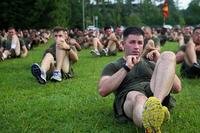We all have career goals -- from dreams of being a professional athlete, dancer or singer to becoming a doctor, lawyer or teacher. Many also dream of serving in the military, police, firefighter, EMT or emergency medical professions. Regardless of your career or life goals, there is one common denominator to accomplishing them: preparation.
Depending upon your goal, it is likely that your preparation began early in childhood. Your education, study habits, athletics, fitness abilities and work ethic formed early in life, long before you started dreaming of a specific profession. However, inspiration, self-motivation and desire can help you accomplish tasks even with a less-than-stellar start in life.
When the days get long and the nights get longer, what motivates you is important. However, your motivation on day one has to evolve into discipline and work ethic by year one. Depending upon the amount of work and time it takes to reach your goal, your discipline may have to last several years -- or even a decade or more for some professions.
So what motivates you?
Where does your mind lead you when it wanders? What resonates with you? Have you ever said, "If I was not a ______, I would have become a ______?"
I have a friend who loves animals, but at a young age, he started his career in the bar and restaurant business. He is now a bar and restaurant owner and loves his job, but recently made the comment, "If I had not become a bar owner, I would be an animal trainer or a veterinarian." He volunteers at the animal shelter and owns about a dozen pets.
Finding a career that motivates you is obviously a worthy goal, but finding a fulfilling hobby can be just as important. Moving toward your professional or personal goal typically involves a similar process.
To turn a goal into reality, determine what you want to do. Get specific. If you want to join the military, ask yourself: What branch of service? Special ops in the future? Do your research. The fitness and educational requirements, training time, the location of training and where you will live or deploy should be part of your decision-making process. How do you maneuver through the recruiting process? How long do you enlist or become an officer?
Simply saying you want to be in the military isn't enough. Within 1-2 years of joining, you need to learn thoroughly about your future life in the military, read related books and understand the recruiting process required of your potential service selection.
Know your options. There is so much to consider before making the commitment to serving, and not knowing how to navigate the process can make your service time less than ideal.
See related articles:
There will be physical and academic standards for any goal in the military. What are they? Make sure you are well aware of what the "entrance exam" to get to the training is. You should take as many practice tests as you can so you can be the best when you take the exam in front of recruiters.
Leaving it to chance is a recipe for failure. You do not want your first impression at your "job interview" to be a failure physically or in the ASVAB.
Be honest with your self-assessment. What are your current levels of abilities? Do you need further time and training to achieve competitive standards for your dream job?
If you feel you need more time to train or improve your grades in post-high school education, do it. This may add 6-12 months to the process, or you may find finishing college before joining the military is a good decision. College or full-time work for a few years can give you the time needed to fix any deficiencies in your credentials to enter your dream job market.
We all have weaknesses. What are yours? Challenging schools with tough selections and high dropout rates will expose your weaknesses quickly, so be honest. This may require you to retake a college course or learn how to swim or run faster to prepare properly for special ops-level selections programs. Common Weaknesses (physical)
Writing down your goal and the path to achieve it is a great motivator. You can make a timeline with sub-goals to achieve along the journey: high school, sports, college, max PT test goals, academics goals, recruiter process, boot camp and so on. Sometimes when you write something down and visualize the path, you may find parallel paths to get to the same destination. Those may be quicker, easier or less expensive. Write it down and hold yourself to these goals and standards.
Regardless of your goal, your new saying in your head should be: "Exceeding the standard is the standard." Compete with yourself to make yourself better in whatever steppingstone to your goal you have to manage. In the end, your persistence will win, and you will find that your motivation, persistence and good habits have become discipline.
Stew Smith is a former Navy SEAL and fitness author certified as a Strength and Conditioning Specialist (CSCS) with the National Strength and Conditioning Association. Visit his Fitness eBook store if you're looking to start a workout program to create a healthy lifestyle. Send your fitness questions to stew@stewsmith.com.
Want to Learn More About Military Life?
Whether you're thinking of joining the military, looking for fitness and basic training tips, or keeping up with military life and benefits, Military.com has you covered. Subscribe to Military.com to have military news, updates and resources delivered directly to your inbox.




















